Filter by
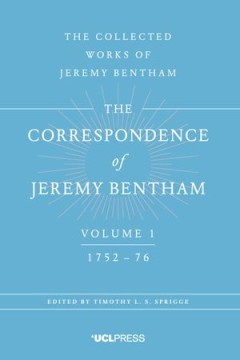
The Correspondence of Jeremy Bentham, Volume 1 : 1752 to 1776
The first five volumes of the Correspondence of Jeremy Bentham contain over 1,300 letters written both to and from Bentham over a 50-year period, beginning in 1752 (aged three) with his earliest surviving letter to his grandmother, and ending in 1797 with correspondence concerning his attempts to set up a national scheme for the provision of poor relief. Against the background of the debates on…
- Edition
- -
- ISBN/ISSN
- 9781911576037
- Collation
- -
- Series Title
- Correspondence of Jeremy Bentham 1
- Call Number
- 800 BEN c
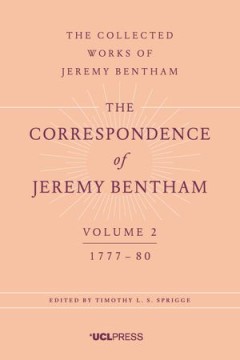
The Correspondence of Jeremy Bentham, Volume 2 : 1777 to 1780
The first five volumes of the Correspondence of Jeremy Bentham contain over 1,300 letters written both to and from Bentham over a 50-year period, beginning in 1752 (aged three) with his earliest surviving letter to his grandmother, and ending in 1797 with correspondence concerning his attempts to set up a national scheme for the provision of poor relief. Against the background of the debates on…
- Edition
- -
- ISBN/ISSN
- 9781911576273
- Collation
- -
- Series Title
- Correspondence of Jeremy Bentham 2
- Call Number
- 800 BEN c
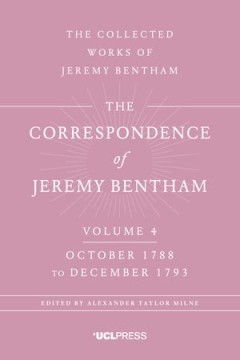
The Correspondence of Jeremy Bentham, Volume 4 : October 1788 to December 1793
The first five volumes of the Correspondence of Jeremy Bentham contain over 1,300 letters written both to and from Bentham over a 50-year period, beginning in 1752 (aged three) with his earliest surviving letter to his grandmother, and ending in 1797 with correspondence concerning his attempts to set up a national scheme for the provision of poor relief. Against the background of the debates on…
- Edition
- -
- ISBN/ISSN
- 9781911576150
- Collation
- -
- Series Title
- Correspondence of Jeremy Bentham 4
- Call Number
- 800 BEN c
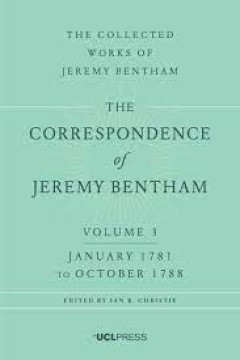
The Correspondence of Jeremy Bentham, Volume 3 : January 1781 to October 1788
The first five volumes of the Correspondence of Jeremy Bentham contain over 1,300 letters written both to and from Bentham over a 50-year period, beginning in 1752 (aged three) with his earliest surviving letter to his grandmother, and ending in 1797 with correspondence concerning his attempts to set up a national scheme for the provision of poor relief. Against the background of the debates on…
- Edition
- -
- ISBN/ISSN
- 9781911576099
- Collation
- -
- Series Title
- -
- Call Number
- 800 BEN c
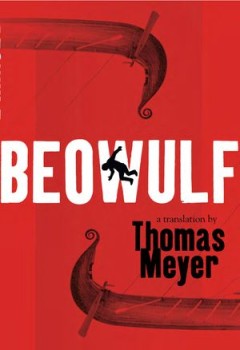
Beowulf : A Translation
Many modern Beowulf translations, while excellent in their own ways, suffer from what Kathleen Biddick might call “melancholy” for an oral and aural way of poetic making. By and large, they tend to preserve certain familiar features of Anglo-Saxon verse as it has been constructed by editors, philologists, and translators: the emphasis on caesura and alliteration, with diction and syntax smo…
- Edition
- -
- ISBN/ISSN
- 9780615612652
- Collation
- -
- Series Title
- -
- Call Number
- 800 MEY b
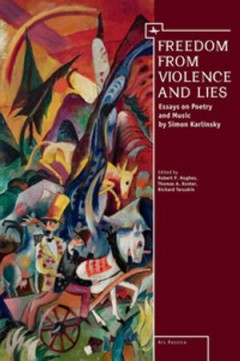
Freedom from Violence and Lies : Essays on Russian Poetry and Music
Freedom from Violence and Lies is a collection of forty-one essays by Simon Karlinsky (1924–2009), a prolific and controversial scholar of modern Russian literature, sexual politics, and music who taught in the University of California, Berkeley’s Department of Slavic Languages and Literatures from 1964 to 1991. Among Karlinsky’s full-length works are major studies of Marina Tsvetaeva and…
- Edition
- -
- ISBN/ISSN
- 9781618111586
- Collation
- -
- Series Title
- -
- Call Number
- 800 KAR f
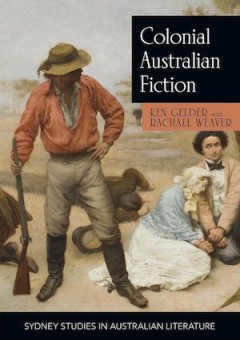
Colonial Australian Fiction : Character Types, Social Formations and the Colo…
Over the course of the 19th century a remarkable array of types appeared in Australian literature: the swagman, the larrikin, the colonial detective, the bushranger, the currency lass”, the squatter, and more. Some had a powerful influence on the colonies’ developing sense of identity; others were more ephemeral. But all had a role to play in shaping and reflecting the social and economic c…
- Edition
- -
- ISBN/ISSN
- 9781743324622
- Collation
- -
- Series Title
- -
- Call Number
- 800 WEA c
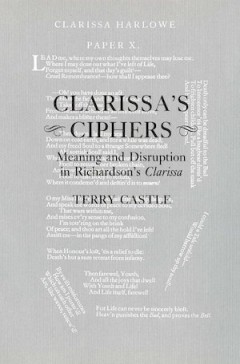
Clarissa's Ciphers : Meaning and Disruption in Richardson's Clarissa
As Samuel Richardson's 'exemplar to her sex,’ Clarissa in the eponymous novel published in 1748 is the paradigmatic female victim. In Clarissa’s Ciphers, Terry Castle delineates the ways in which, in a world where only voice carries authority, Clarissa is repeatedly silenced, both metaphorically and literally. A victim of rape, she is first a victim of hermeneutic abuse. Drawing on feminist…
- Edition
- -
- ISBN/ISSN
- 9781501707148
- Collation
- -
- Series Title
- -
- Call Number
- 800 CAS c

Adulterous Nations : Family Politics and National Anxiety in the European Novel
In Adulterous Nations, Tatiana Kuzmic enlarges our perspective on the nineteenth-century novel of adultery and how it often served as a metaphor for relationships between the imperial and the colonized. In the context of the long-standing practice of gendering nations as female, the novels discusse—Eliot's Middlemarch, Fontane's Effi Briest, and Tolstoy's Anna Karenina, along with Enoa's The …
- Edition
- -
- ISBN/ISSN
- 9780810133983
- Collation
- -
- Series Title
- -
- Call Number
- 800 KUZ a
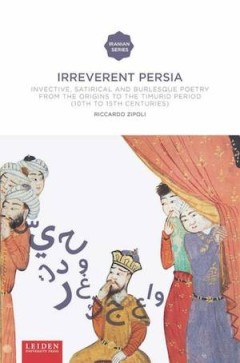
Irreverent Persia : Invective, Satirical and Burlesque Poetry from the Origin…
Poetry expressing criticism of social, political and cultural life is a vital integral part of Persian literary history. Its principal genres - invective, satire and burlesque - have been very popular with authors in every age. Despite the rich uninterrupted tradition, such texts have been little studied and rarely translated. Their irreverent tones range from subtle irony to crude direct insul…
- Edition
- -
- ISBN/ISSN
- 9789087282271
- Collation
- -
- Series Title
- -
- Call Number
- 800 ZIP i
 Computer Science, Information & General Works
Computer Science, Information & General Works  Philosophy & Psychology
Philosophy & Psychology  Religion
Religion  Social Sciences
Social Sciences  Language
Language  Pure Science
Pure Science  Applied Sciences
Applied Sciences  Art & Recreation
Art & Recreation  Literature
Literature  History & Geography
History & Geography